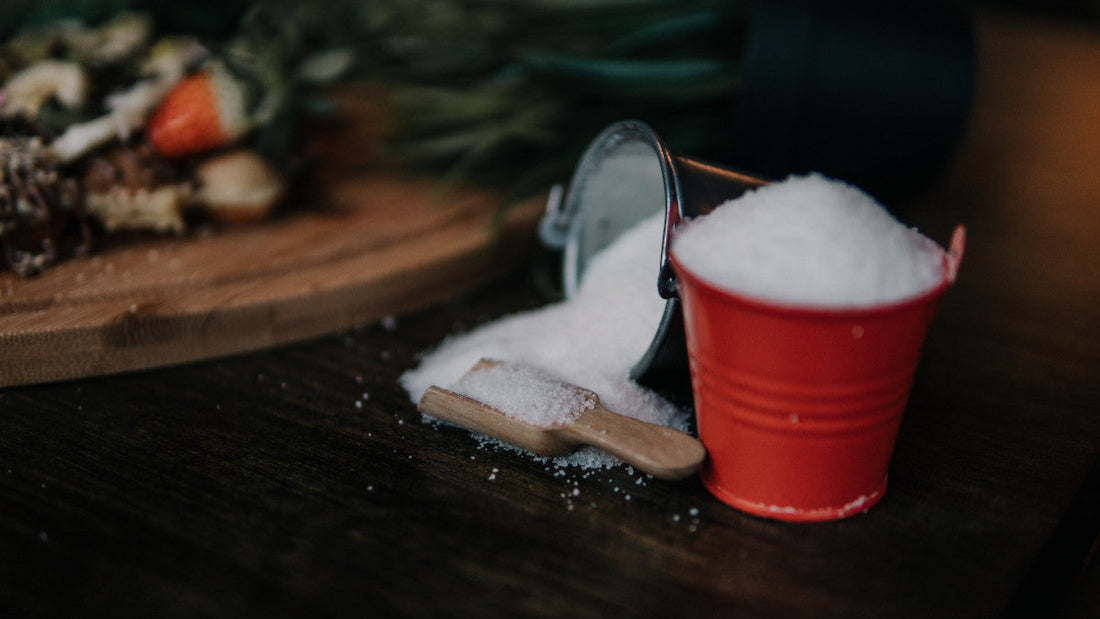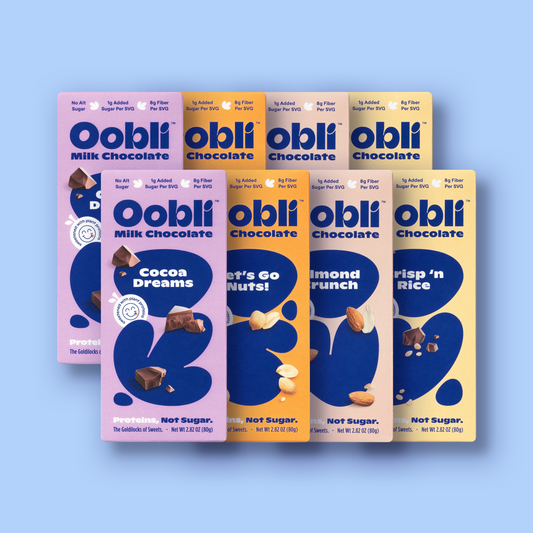When it comes to sweeteners, it feels like there's an ever-growing list to choose from. But how do you know which one is best for your health, or which one comes with unwanted side effects and risks?
Today, we’ll discuss two popular sweeteners: stevia vs Splenda (sucralose). We’ll help you understand the differences between stevia vs Splenda, break down the pros and cons of each, and compare the Splenda vs stevia side effects.
Stay tuned for our recommendation at the end - we’ll introduce you to a sweetener that might just blow both stevia and Splenda out of the water!
What is the Difference Between Stevia and Splenda?
Before we discuss which is better Splenda or stevia, let’s take a look at each of these sweeteners individually, and the key differences between the two.
What is Stevia?
Stevia, scientifically known as Stevia rebaudiana, is a natural sweetener derived from the leaves of the stevia plant, native to South America. The sweetness of stevia comes from naturally occurring compounds called steviol glycosides, including stevioside and rebaudioside A.
These compounds are incredibly sweet but calorie-free. Stevia has been used for centuries by indigenous populations in South America to sweeten beverages and foods. In recent years, it has become a popular zero-calorie sweetener.
Because stevia is derived from a plant, it often appeals to people seeking natural and minimally processed sweeteners. Stevia is significantly sweeter than sugar, with some derivatives being up to 300 times sweeter, so a little goes a long way.
What is Splenda?
Splenda is the brand name for a sucralose-based artificial sweetener. Sucralose is made by chemically modifying sucrose, which is ordinary table sugar, to replace three hydrogen-oxygen groups with chlorine atoms.
This alteration makes sucralose non-caloric because the human body cannot fully metabolize it. Splenda (sucralose) is widely used as a sugar substitute in a variety of food and beverage products and is known for its sugar-like taste and stability under various cooking and baking conditions.
Now that we have a better understanding of what these two sweeteners are, let's delve deeper into the differences between Splenda vs stevia and their potential advantages and disadvantages.
Splenda vs Stevia: Which is Better?
So, which is better Splenda or stevia? At the end of the day, it depends on your criteria. Let’s take a look at some different categories, and whether Splenda vs stevia comes out on top in each one.
Which Tastes Better?
Taste can be divisive and subjective when it comes to artificial sweeteners. So, who wins the stevia vs Splenda taste battle? Splenda is often favored for its sugar-like taste, with minimal to no aftertaste, making it a popular choice for those seeking a sweetener that closely mimics the flavor of sugar.
On the other hand, stevia tastes bad to a lot of people. It has an intense sweetness, but many of us notice an intensely bitter aftertaste, particularly with certain stevia products. In fact, some food and drink manufacturers that use stevia have to add even more artificial flavors to mask the intense stevia flavor.
Which is Better For You?
In terms of your health, which is better Splenda or stevia? While stevia is often favored for being natural, it can still cause bloating, nausea, dizziness, and headaches, particularly if you consume too much stevia. It's also been linked to changes and communication issues in the gut microbiome.
Also, it’s important to understand the concerns around stevia and pregnancy if you’re expecting. And, sorry to burst your stevia weight loss bubble, but this sweetener can actually cause weight gain, increase BMI, and elevate waist circumference.
Because Splenda is chemically produced, it comes with its own set of health concerns. Our bodies aren’t used to digesting sucralose, so it can cause intolerance to artificial sweeteners symptoms, like bloating, gas, cramps, and more.
Even more concerning, sucralose has been linked to genotoxicity.
Also, many people experience sucralose headaches after consuming the sweetener, and it’s also important to understand the relationship between sucralose and keto diets - Splenda isn’t as keto-friendly as we once thought.
Which is More Versatile?
For Splenda vs stevia, which is more versatile? Splenda boasts high heat stability, making it a good choice for cooking and baking. It maintains its sweetness even when exposed to high temperatures, which is helpful for cakes and other baked goods.
Stevia, doesn’t perform as well under extreme heat, and its intense sweetness might require adjustments in recipes.
Which is More Accessible?
Splenda has become the most popular form of sucralose, and can easily be purchased in stores or online. Splenda is available both in powder (similar to table sugar) or liquid form.
Stevia is also available in powder and liquid form, but it’s harder to find in stores. There are online options, but not as many choices as Splenda. In terms of accessibility, Splenda wins this round.
So, Which is Better Splenda or Stevia?
So, which is better Splenda or Stevia? The answer to this question ultimately depends on your specific needs and preferences. If the stevia vs Splenda taste is important to you, and you need a sweetener with versatility for cooking and baking, Splenda might be the better choice.
On the other hand, if you seek a more natural, calorie-free sweetener, stevia could be the preferred option. But what about other artificial sweeteners, like aspartame or erythritol? Let’s take a look at those next.
How Do They Stack Up to Other Artificial Sweeteners?
When it comes to sucralose vs stevia vs aspartame, aspartame comes with just as many health concerns as the sweeteners we’ve already discussed. In fact, many people turn to aspartame detoxing and search for diet drinks without aspartame due to the risks associated with this sweetener.
Is aspartame bad for teeth? Yes - it’s naturally quite acidic, which can break down enamel and cause tooth decay. There are also aspartame neurological effects you should be aware of, including migraines.
What about other sweeteners, what are the dangers of erythritol? Erythritol is a sugar alcohol, and has recently been shown to increase your risk of heart disease and stroke, so it might be worth searching for an erythritol substitute.
Do artificial sweeteners cause inflammation? Many artificial sweeteners cause inflammation, particularly in the gut, because our bodies simply aren’t used to digesting these artificial compounds.
Why We Don’t Recommend Stevia OR Splenda
So, which is better Splenda or stevia? Taking into account the stevia vs Splenda taste and the side effects associated with each sweetener, we don’t recommend stevia or Splenda. They both come with their own health risks and concerns, and aren’t a healthy addition to a balanced diet.
Of course, consuming a small amount of these sweeteners shouldn’t cause any long-term side effects, but if you’re seeking them out because you believe they’re healthier than sugar, that may not be the case. Luckily, we’ve got something much better to offer you!
Introducing a Superior Sweetener: Sweet Proteins!
At Oobli, we were shocked when we started to look into the dangers of different artificial sweeteners. So, we took matters into our own hands and developed a better way to sweeten our favorite treats, without the unwanted Splenda vs stevia side effects. Our solution: sweet proteins!
Sweet proteins are natural proteins found in tropical fruits. They can be up to 5,000 times sweeter than sugar, and don’t need any chemical modifications or intense processing. They’re a fantastic, natural alternative to sugar, and much safer than artificial sweeteners.
Another benefit of sweet proteins is that they don’t bring a taste with them. They add sweetness to your favorite food or beverage, without changing the flavor. Plus, sweet proteins as a sugar substitute use far less land and water to produce - they’re so much better for the planet!
How are sweet proteins made? At Oobli, we use precision fermentation protein to naturally produce our sweet proteins, similar to how beer, wine, and cheese are made.
Bringing Our Conversation on Splenda vs Stevia to a Close
At the end of the day, it’s hard to pick a winner between these two artificial sweeteners. The Splenda vs stevia side effects alone make it impossible to recommend either of these sweeteners as part of a balanced diet.
Unfortunately, other artificial sweeteners aren’t any better. Short-term side effects like headaches and bloating are common, while more serious long-term effects like links with certain cancers are much more concerning.
Instead, we’re revolutionizing the way your favorite snacks are sweetened. We’ve harnessed the incredible natural power of sweet proteins to create the best best sugar free drinks - our selection of refreshing, fruity, low sugar tea.
It’s available in a selection of quenching flavors and is the perfect way to enjoy a tasty can of something sweet without the guilt or calories of sugar, and without the harmful side effects of artificial sweeteners.
Our incredible, decadent chocolate bars are just the same! With just a handful of natural ingredients, we’ve created clean, delicious dark chocolate that tastes as amazing as it leaves you feeling. Goodbye guilt, hello decadence!
Don’t settle for artificial sweeteners and the health hazards they bring. Treat yourself to natural goodness from Oobli instead!




